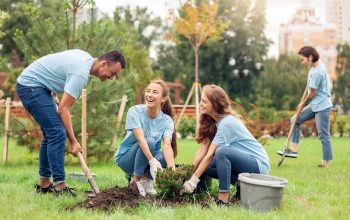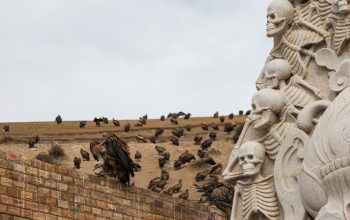With the death riots held across the United States, following the reported death of George Floyd by a policeman in Minneapolis, mainstream media have switched their darling. COVID 19 now is on the backbench while “protests” take the front. But what does the corona scare spanning over the past 3 months tell us about the interplay of politics, authority, and institutions in a society, particularly in contemporary American society. Voluntaryist Dave Scotese offers his analysis on Word Matters.

WM: The so-called COVID 19 pandemic bought normal life and activities in America to a halt via lockdowns, shutdowns, and new regulations regarding social space and practices in public places. Many people followed these regulations and restrictions that many others saw as unnecessary and politically motivated. Do you think this “pandemic” and subbasement restrictions were unnecessary and politically motivated. If yes, why you think so?
Dave: There are certainly many people with some political power who respond to large events in a way calculated to get them re-elected or re-appointed, or to increase the power they wield, and this illness is a very large event. My understanding of the lethality of this illness is that it’s like the flu, maybe a bad flu, or perhaps your average flu. As a voluntaryist, I see all restrictions as unnecessary, but I can view this issue as though I hold the responsibility to decide how others act too, because I raised kids. When I view it that way, I still see the restrictions as unnecessary, mainly because they have always been unnecessary in the past regarding the flu (both the bad flu and your average flu). If the restrictions are political, I would guess that the motivation is that the people with power want to know how much control they have.
WM: What does the response of people who believed the health authorities – specifically CDC, Dr. Fauci, and the WHO – tell you about them? What really made them scared?
Dave: It tells me they are normal people. School teaches us that authorities don’t make mistakes (or, if they do, keep your mouth shut about it), and we internalize that lesson. It takes a while to recover enough critical thinking skills to see the problem, so their belief in so-called “health authorities” is normal. What makes people scared is death. Have you read the CDC notice about the new code for this illness, seemingly begging health workers to blame the new virus if at all possible, for any death? Hermann Koch, back in the late 1800s, proposed four requirements to establish a causative relationship between a microbe and a disease, and the first says, at the end, “should not be found in healthy organisms.” There are loads of asymptomatic people who tested positive for nCovid19.
WM: Many people refused to believe in the “pandemic” and need for associated restrictions and defied the restrictions. What do you call that part of the society and why?
Dave: There are a lot of people who, like me, looked around for the counterevidence to the claims authorities made, and found plenty of it. I’ve referenced some of it above, but there are particular bits that I view as convincing. World Health Organization Director General Tedros Ghebreyesus made a mistake (described here) when calculating the lethality of the virus. This error has never been corrected as far as I know. Health workers have complained that they are being pressured to attribute deaths to the virus regardless of their beliefs about the cause of death. CNN has aired a video from foreign countries pretending it was from New York. Federal Health programs provide extra money to hospitals for the diagnosis and escalation of care and ultimate death when the virus is claimed to be involved. I am among those who refuse to believe the hysteria, view the restrictions as unnecessary, and ignore them. More people catch on every day, and I think that is why there is now a concerted effort to create riots and thereby justify extra measures of “protection” or “oppression” depending on how you want to view it.
WM: What does the collective response to this so-called COVID 19 “pandemic” tell us about the general social standing of the people around the world?
Dave: Some people, like my friend Ernie, like to simplify things little more than I’m comfortable doing. For example, he refers to “the collective response” to the pandemic and asks what that response tells us about the general social standing of people around the world. Unfortunately, I can’t collectivize people like that, and the distinctions for me are way brighter than the similarities. I am happy to see so many people “waking up” to the fact that “reputable” news sources sometimes make “honest mistakes” which create bias in their viewers, but the “honest mistakes” are nearly always creating bias in the same (pro-authoritarian) direction. The mainstream media is the lapdog of authority, and there will always be loads of people who allow themselves to be brainwashed by it. Fortunately, on the other hand, they kind of “jumped the shark,” meaning they have overplayed their hand and people are figuring out that they can’t exert that much power over us. Cheating is likely to increase rapidly, but I like that. I prefer that people obey their conscience and ignore the law than obey the law and ignore their conscience.
WM: A related question – what does this experience tell us about the power of institutions versus the power of people?
Dave: This entire experience shows me that institutions are like ideas. If they are bad, they cause lots of problems and slowly die. If they are good, people join in and they take off and benefit humanity ever more. However, this begs the question, is “English” an institution? Or math or calculus? If we restrict “institution” to mean a group of people cooperating toward some ostensible end, this experience drives home Lord Acton’s point that “power corrupts.” It is in saying, and the doing of it, that “I will obey the law,” which defiles the conscience, insinuating that the Word of God (or, for the atheists, basic morality) is NOT written on the hearts of men as Jeremiah suggested. Obey your conscience instead. It’s a much better guide. We each must be careful how much damage we allow institutions to do to our basic humanity.
WM: They are talking of a second wave of COVID coming. What do people skeptical of the mainstream media’s narrative need to do to counter the fake news pandemic of establishment media?
Dave: In the face of the prediction that COVID will come back in waves, I think truth, science, and humility are on the side of good. As seasons change, conditions get better and worse for the various illness-causing agents out there. Maybe there are other factors that will contribute to “waves,” but my recommendation is to remember that immune systems atrophy, so sloppiness has some merit. Exercise and sunshine are two of the best ways to boost your immune system. People who are vulnerable must take responsibility for their health and do their best to stop authoritarians from trying to take that responsibility away from them. It is the reliance on authorities that got us into this mess, so whatever you can do to benefit less from their meddling will help you and those you love in the long run.
Dave Scotese is the volunteer webmaster for voluntaryist.com. He promotes curiosity and innocence in an effort to delegitimize the idea that punishment is an effective strategy for social cohesion. He recognizes that many people are taught at a very young age that punishment is the best way to maintain order, and he believes this teaching is flawed. He urges that publication and dialog be used in place of man-made suffering so that peaceful peer pressure can take over as the engine of social cooperation. He writes about these things and lots of geeky tech stuff (but not too much!) at http://litmocracy.blogspot.com.


